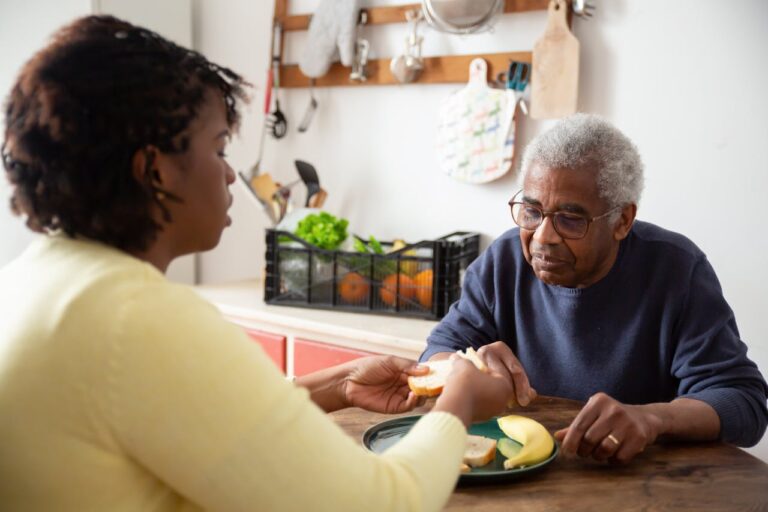
Stay Safe in the Kitchen Seniors
The kitchen, often considered the heart of the home, can be a place of joy and creativity. But for seniors, it can also be a source of potential hazards. With age comes wisdom, but also certain physical limitations that make it crucial to focus on kitchen safety. This blog post aims to provide valuable tips to help seniors reduce the risk of fire and cooking accidents, ensuring a safer and more enjoyable cooking experience.
The Vital Importance of Kitchen Safety for Seniors
The kitchen is a bustling area filled with various appliances, sharp objects, and hot surfaces. For seniors, these factors can pose significant risks. Understanding and mitigating these hazards is essential to maintaining a safe environment. The primary goal of this post is to help seniors and their caregivers create a safer kitchen space by reducing fire and cooking accident risks.
Understanding the Risks
Common Kitchen Hazards
Kitchen hazards are numerous, but some are particularly common among seniors. Spills on the floor can lead to slips and falls, which are especially dangerous for older adults. Burns from hot surfaces or boiling liquids can cause severe injuries. Electrical fires are another risk, often stemming from outdated or improperly maintained appliances.
Why Seniors are Vulnerable
Seniors are particularly vulnerable to kitchen hazards due to several factors. Reduced mobility can make it difficult to move quickly or avoid dangers. Diminished vision can lead to accidents involving sharp objects or hot surfaces. Cognitive decline may result in forgetfulness, such as leaving a stove on, increasing the risk of fire.
Room-by-Room Lighting Tips
Setting Up the Kitchen for Safety
A well-organized kitchen can significantly reduce the risk of accidents. Here are some tips:
- Arrange frequently used items within easy reach to avoid the need for climbing or bending.
- Use clear labels on containers to minimize confusion and ensure safe use of ingredients and appliances.
- Ensure adequate lighting to help seniors see clearly while cooking and moving around the kitchen.
Updated Appliances with Safety Features
Modern appliances come with various safety features designed to prevent accidents. Consider these updates:
- Induction cooktops, which are cooler to the touch compared to traditional stovetops, reducing burn risks.
- Automatic shut-off kettles and ovens that turn off after a set period, preventing fires.
- Install smoke detectors and carbon monoxide detectors in the kitchen area for added safety.
Safe Cooking Practices
Adopting safe cooking practices can make a significant difference:
- Always use oven mitts or potholders when handling hot pots and pans.
- Turn pot handles inward to prevent accidental spills and burns.
- Avoid wearing loose clothing that could catch fire while cooking.
Importance of Regular Maintenance
Checking and Maintaining Appliances
Regular maintenance of kitchen appliances is crucial for safety:
- Inspect cords and plugs for damage, and replace any that show signs of wear.
- Clean ovens, stovetops, and microwaves regularly to prevent grease build-up, which can be a fire hazard.
- Ensure that ventilation systems, such as range hoods, are working correctly to avoid the build-up of smoke and fumes.
Role of Family Caregivers and Support Networks
Family caregivers and support networks play a vital role in maintaining a safe kitchen environment:
- Conduct regular safety checks and maintenance routines.
- Educate seniors on the proper use of new appliances and safety features.
- Provide assistance with tasks that may be physically challenging for seniors.
Emergency Preparedness
What to Do in Case of a Kitchen Accident or Fire
Being prepared for emergencies can save lives. Here’s what to do:
- Keep a fire extinguisher in the kitchen and ensure everyone knows how to use it.
- Install a smoke alarm and test it regularly to ensure it’s functioning correctly.
- If a fire occurs, evacuate the area immediately and call emergency services.
Creating a Fire Escape Plan
A well-thought-out fire escape plan can make all the difference:
- Map out multiple exits from the kitchen and the rest of the home.
- Practice the escape plan regularly with all household members.
- Keep important items, like glasses and medications, easily accessible in case of an emergency.
Conclusion
Kitchen safety is paramount for seniors, and implementing these tips can significantly reduce the risk of accidents and fires. By organizing the kitchen, using modern appliances, adopting safe cooking practices, and preparing for emergencies, seniors can enjoy a safer and more pleasant cooking experience. Share this information with your loved ones and support networks to help spread awareness and ensure a safer environment for all.
For more personalized advice and support, consider booking a call with one of our experts, who can help you tailor these tips to your specific needs and circumstances. Stay safe and happy cooking!